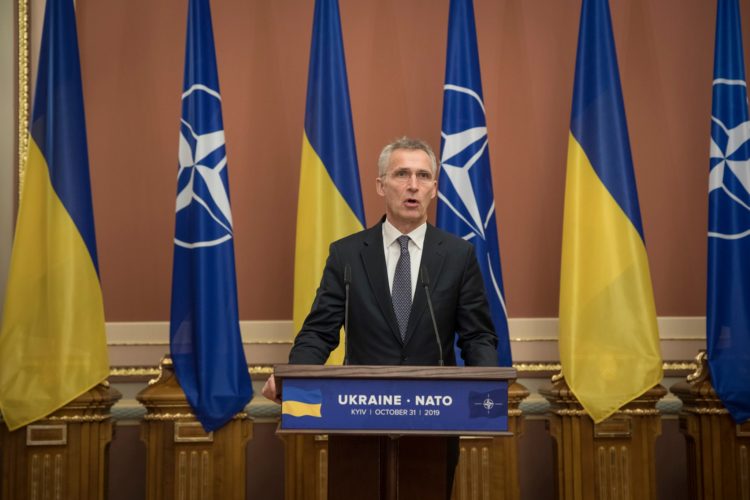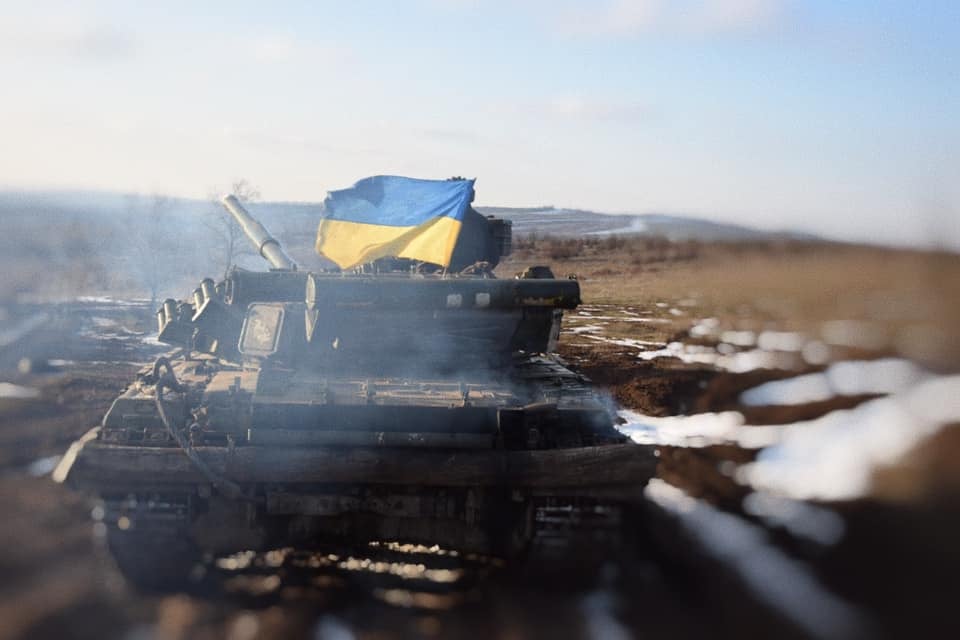While NATO is not obliged to defend Ukraine, it is committed to defending itself. That responsibility just happens to start in Ukraine, writes military analyst Hans Petter Midttun about NATO's warranted response to Russia.
NATO messaging has been consistent since Russia started its hybrid war against Ukraine. Its support for Ukrainian sovereignty and territorial integrity remains unwavering. Allies stand by their decisions taken at the Bucharest Summit and support Ukraine on this path towards NATO membership. It remains committed to providing political and practical support to Ukraine.
On a more downbeat note, however, the alliance simultaneously emphasizes that Ukraine is not a NATO member and is, therefore, not entitled to the security guarantees enshrined in the Washington Treaty.
That does not mean, however, that NATO is not committed to fighting alongside the Armed Forces of Ukraine in Ukraine. It is crucial to differentiate between both (the lack of) political resolution and military necessity, as well as the security guarantees enshrined in the Washington Treaty, and NATO's essential and enduring purpose as laid down in its strategic concept.
“The achievement of this aim can be put at risk by crisis and conflict affecting the security of the Euro-Atlantic area. The Alliance therefore not only ensures the defense of its members but contributes to peace and stability in [Europe].”
This includes Ukraine.
The essential core tasks remain the same today.
One of the three tasks, crisis management, states that
“NATO will actively employ an appropriate mix of [...] political and military tools to help manage developing crises that have the potential to affect Alliance security, before they escalate into conflicts; to stop ongoing conflicts where they affect Alliance security [...].”
The consequences of a Russian victory in both Belarus and Ukraine would be devastating to European security. To fulfill its main purpose: “to safeguard the freedom and security of all its members,” NATO urgently needs to deny a Russian victory in Ukraine. While we are not obliged to defend Ukraine, we are committed to defending ourselves.
While the political commitment and courage might be lacking, the military logic remains more relevant than ever. NATO is, therefore, facing its defining moment. The situation warrants N
What if Russia wins in Ukraine? Consequences of Hybrid War for Europe (Part 2)
If NATO does not act according to its strategic concept and fails to stop the conflict from escalating out of control undermining the security of its member states, how can it possibly argue that it is safeguarding the freedom and security of all NATO members? If it stands idle observing a conflict turn into a war at NATO’s borders, why should we believe, that the Alliance will live up to its collective defense commitment? How can NATO credibility survive without a free and secure Ukraine?
Defining moment? Why now?

In 2007 President Vladimir Putin held the famous Munich speech where he expressed Russia’s deep dissatisfaction with the world order and NATO eastward expansion, arguing for the need to rethink the international security architecture.
He argued that
“we are witnessing an almost uncontained hyper use of force – military force – in international relations, a force that is plunging the world into an abyss of permanent conflicts. As a result, we do not have sufficient strength to find a comprehensive solution to any one of these conflicts. Finding a political settlement also becomes impossible.”
We didn’t believe him.
In 2008, Estonia, Latvia, and Lithuania argued that Russia’s 2008 invasion of Georgia was a dress rehearsal for further operations against democracies bordering Russia.
We didn’t believe them.
Since 2014, Ukraine has argued that it is defending Europe against Russian aggression.
So far, we have chosen not to believe them either.
Nearly 15 years after Putin's speech at the Munich Security Conference, and after Russia has plunged Europe and its adjacent regions into an “abyss of permanent conflicts,” finding a political settlement has become close to impossible without negotiating with Russia. In the middle of what is seen to be a Russian-initiated energy and migration crisis in Europe, and as the Russian Federation is massing military forces along the Ukrainian borders, some European countries remain reluctant to recognize the security challenges NATO is facing.
Having created the tension and achieved the attention he demands, President Putin has called for negotiations on a legally binding agreement that will rule out any further eastward expansion of NATO and the deployment of weapons systems posing a threat to Russia near its territory.
Putin’s offer to “stop NATO expansion”: the reason behind Russia’s month of aggression
On December 10, the Ministry of Foreign Affairs of the Russian Federation elaborated on the demands for NATO to stop its eastward expansion. On December 13, Deputy Foreign Minister Sergey Ryabkov argued that the Paris Charter which "fully recognizes the freedom of States to choose their own security arrangements,” must be balanced by the phrase “that this must not be done at the expense of the security of other states.”
He warned all countries opposing Russia’s right to veto NATO membership decisions will face grave consequences.
December 17, Russia published both a draft treaty between the USA and the Russian Federation “on security guarantees,” as well as a draft agreement on “measures to ensure the security of the Russian Federation and the Member States of the North Atlantic Treaty Organization.”
[bctt tweet="The geostrategic implications of the demands go far beyond Ukraine. Like the hybrid war, it affects both NATO and the EU." username="euromaidanpress"]
Impossible ultimatums with a badly concealed warning
NATO is being asked to refrain from any further enlargement. This has bearings on all countries aspiring to become NATO members. While Ukraine and Georgia are the most obvious victims, the ultimatum also encompasses Sweden and Finland if they should decide to seek membership status in the future.
Russia wants to regulate NATOs force posture in all countries which joined the Alliance after 1997 (Albania, Bulgaria, Croatia, the Czech Republic, Estonia, Hungary, Latvia, Lithuania, Montenegro, North Macedonia, Poland, Romania, Slovakia, and Slovenia). Having started wars in Europe, Russia wants to limit the Alliance ability to forward deploy units in response to its aggressive foreign policy.
By demanding the USA refrain from flying heavy bombers or deploying surface warships, including in the framework of the Alliance, in areas “where they can attack targets in the territory” of Russia, they call on NATO in principle to refrain from operating in the Black Sea, the Baltic Sea, the Barents Sea and the Arctic, as well as the airspace over Northern, Central and Eastern Europe.
The USA is being told to withdraw its nuclear weapons from Europe and eliminate all existing infrastructure on the continent.
Seeking security guarantees on the “basis of mutual respect for and recognition of each other’s security interests and concerns,” the treaty includes a badly concealed warning.
Russia having a nuclear doctrine allowing for the right to use nuclear weapons to end conventional military conflicts uses the treaty to raise the stakes through “escalate to de-escalate.” It warns the USA that a “direct military clash between them could result in the use of nuclear weapons” while stressing that “… a nuclear war cannot be won and must never be fought.”
Neither the treaty nor the agreement, however, prevented Russia from expanding westward. Asking NATO to “withdraw” its forward presence from former USSR countries (NATO members after 1997), it is paradoxical to realise that Russia itself is occupying and/or waging war against former USSR countries in direct contradiction to the agreement. The fact that it denies any role in its war against Ukraine has, however, a direct bearing on the sustainability of both the treaty and agreement.Russia itself is occupying and/or waging war against former USSR countries in direct contradiction to the agreement.
Since it cannot possibly stop something it claims it is not doing, we must expect Russia to continue “business as usual.”
Worse still, Russia demands a change to one of the key principles of the Paris Charter and the recognition of "the freedom of States to choose their own security arrangements.”
Redesigning the international security architecture introduces the following:
- the idea that Russia has a sphere of influence and an acceptance that Russia has the right to control what neighbours do, or not do;
- the ridiculous notion that the national interests of great powers trump the rights of the smaller, sovereign, and independent nations. This includes all of the European countries.
Even the geography itself is distorted. The term “Russian borders” does not refer to the present state borders.
On November 18, President Putin referred to NATO anti-missile defense systems deployed “right next to our borders in Romania and Poland.”
In NATO's response to Russia, dialogue alone must be off the table
This brings us back to the question about NATOs defining moment in the face of a clear and present danger, NATOs credibility, and its essential core task to stop ongoing conflicts where they affect Alliance security.
It is not possible to find the Russian aggressive foreign policy, its ongoing hybrid war against both Ukraine and the West, its ultimatums and threats, and its attempt to dismantle the international security architecture as anything but entirely unacceptable. The sum of which represents a direct threat to the freedom and security of both all NATO members and partners.
Unless forcefully rejected and reciprocated, European security is at peril. Russia is challenging NATOs ability “to safeguard the freedom and security of all its members.” The credibility of the Alliance and its ability to deter future conflicts and wars are being put to the test.
When the nations that know Russia the best stress that Russia only responds to strength, we need to sit up and pay attention. After nearly 8 years of failed dialogue, in NATO's response to Russia, dialogue alone must now be off the table.
[bctt tweet="A military alliance must be willing to resort to military power when other means do not work." username="euromaidanpress"]
Ironically, during the Munich Speech, President Putin quoted Franklin D. Roosevelt. When the Second World War erupted in early September 1939, FDR said: “When peace has been broken anywhere, the peace of all countries everywhere is in danger.”
Ironically, because Roosevelt tried to warn his audience that neither neutrality nor distance could guarantee American security in a globalized world, while he pledged peace, he wanted the USA to take a more active role.
Today, NATO and the EU are the audience.
It is time to rise to the occasion and demonstrate the resolve and courage needed. While we are not obliged to defend Ukraine, we are committed to defending ourselves. That responsibility just happens to start in Ukraine. NATO needs to help Ukraine to help us stop Russia at Ukraine’s eastern borders to safeguard our common values and principles.
Related:
- Putin’s offer to “stop NATO expansion”: the reason behind Russia’s month of aggression
- An ultimatum in any language: experts on Russia’s demand that NATO not expand
- Putin’s offer to “stop NATO expansion”: the reason behind Russia’s month of aggression
- What if Russia wins in Ukraine? Consequences of Hybrid War for Europe (Part 2)





